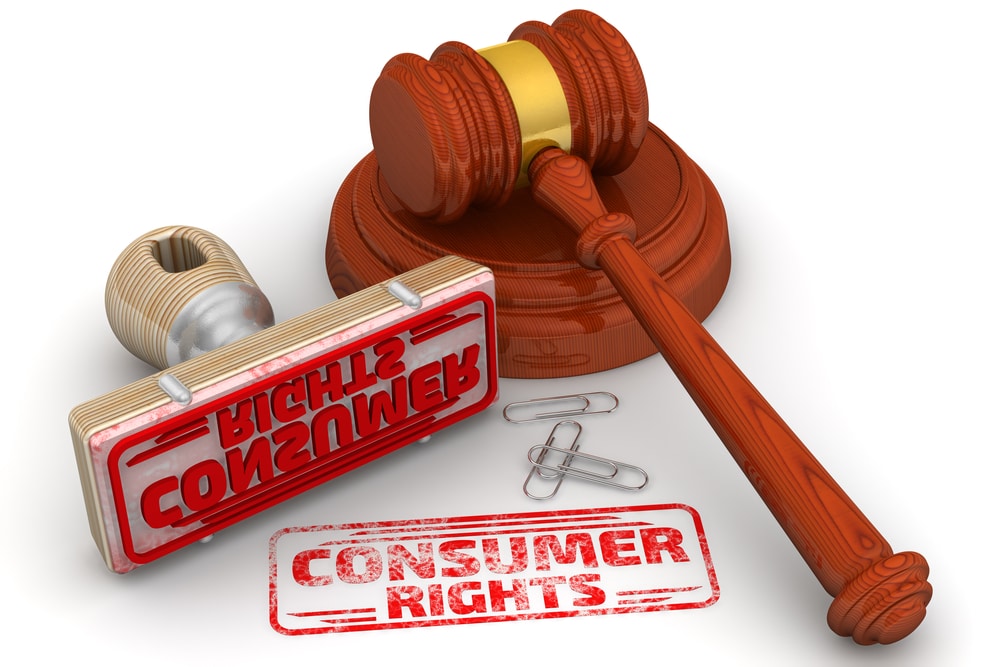CONSUMER RIGHTS LAW FIRM SERVING CLIENTS IN CHICAGO, ILLINOIS, AND NATIONWIDE
The government has enacted laws which protect consumers from being victimized by fraudulent and deceptive business practices. Consumer fraud laws also establish potential remedies potentially available for consumer fraud victims, including financial compensation for losses, punitive damages, and attorney’s fees. A new concern is consumer fraud over the Internet.
This page will provide you with a basic overview of the protections afforded by consumer fraud laws and the Consumer Fraud Act, but it cannot advise you about your specific case. In order to learn more about your rights, we recommend that you speak with one of the lawyers at Markoff Leinberger. We also have extensive experience with federal credit laws designed to protect consumers.
What are the most common types of consumer fraud?
There are many common areas where consumers are targeted with various scams. That’s where the Consumer Fraud Act of Illinois comes into play, along with appropriate federal consumer laws. These are three of the most common types of consumer fraud happening currently:
- Identity theft — If another individual has stolen your personal information, such as your Social Security number, your name, email, or items such as passwords or credit card numbers, this is identity theft. Identity theft usually occurs through data mining, where companies or individuals buy or steal raw data to use to gain access to bank accounts, Social Security benefits, or other benefits that are linked to your legal name and other identifying criteria.
- Credit card fraud — Credit card fraud is so common you’d be hard pressed to find a person who has had a credit card for anything over five years who hasn’t had it used illegally by someone else. Credit or debit card fraud occurs when another person physically steals and possesses your card or otherwise acquires the card number and information and then uses the stolen card to make purchases or to withdraw money. According to the Fair Credit Billing Act, credit card charges must amount to more than $50 to be eligible for dispute.
- Mortgage fraud — Today mortgage scams are often aimed at distressed homeowners. These scams include foreclosure rescue schemes, loan modification schemes, and equity skimming, among others. These frauds are often carried out by real estate and mortgage professionals who misuse their specialized knowledge and authority.
Other common types of consumer fraud involve fake charities, prize and lottery fraud, debt collection fraud, COVID-19 scams, and deceptive interest rate reduction robocalls.
Illinois Consumer Fraud And Deceptive Business Practices Act
Most consumer fraud cases in the state of Illinois are covered under the Illinois Consumer Fraud and Deceptive Business Practices Act (commonly referred to as the Consumer Fraud Act). This law imposes damages on businesses who do anything that is considered deceptive and who intend that consumers will rely on their actions when making a purchase.
The Consumer Fraud Act provides a broad interpretation of what constitutes deceptive conduct. It not only covers intentionally deceptive behavior, but also careless misrepresentations and omissions which make it likely that a consumer will be confused. That is, even if somebody represents something as believing it to be true, and the representation turns out to be false, the consumer may have a consumer fraud claim.
There are three different types of deceptive or fraudulent practices addressed by the Consumer Fraud Act:
- Affirmative acts – These actions include deception, fraud, misrepresentation, and false promises.
- Knowing omissions – These actions include concealment, suppression, or omission of a material fact.
- Violations of specific sections of the Consumer Fraud Act and similar laws.
You do not need to prove that a business intended to violate the law in order to recover compensation under the Consumer Fraud Act. You simply must demonstrate that a section of the law has been violated and you were damaged (e.g., lost money) from it.
Client Testimonial
"This review and has been long overdue. Karl Leinberger & Staff has been exceptionally accommodating to any of my questions and needs. Everything was handled with such professionalism and on a timely manner. He kept me well aware of my case and made sure I had clear clarity. Thank you for all your hard work and commitment through my time of despair. I would highly recommend your firm to others who find themselves in my situation, Keep up the good work!"
What happens if you don’t follow consumer law?
 Consumer law is intended to prevent dangerous or unethical business practices. These laws ensure the products a person purchases are made of materials they were claimed to be and are of the quality they should be. In finance, these laws prevent predatory lending, housing discrimination, privacy violations, and other unethical practices.
Consumer law is intended to prevent dangerous or unethical business practices. These laws ensure the products a person purchases are made of materials they were claimed to be and are of the quality they should be. In finance, these laws prevent predatory lending, housing discrimination, privacy violations, and other unethical practices.
The most common kinds of abusive business practices occur when consumers are in vulnerable circumstances, such as when behind on their mortgage or other bills. Debt collectors can force themselves into the person’s life by calling at early or late hours, contacting the person at work, and so on. Consumer rights laws prohibit this sort of activity and can result in statutory damage awards to the victim, plus attorney’s fees.
Predatory lending leads to many consumer protection lawsuits. These are schemes such as charging exorbitant interest rates on credit cards and other loans, hiding fees and penalties in the fine print of the agreement, and other lending scams. Federal legislation such as the Truth in Lending Act is aimed at these violations of consumer law.
Other consumer rights laws seek to protect consumers from false or misleading advertising. This would include “bait and switch” ploys where one price is advertised in the window, but when the consumer tries to get that price, they are told the item is no longer available. The consumer is then pressured to buy another item at a regular higher price. This is especially prevalent in the automobile world.
One problem facing consumer rights victims is the relatively small amount involved in the damages they suffer as a result of a company’s improper conduct. The loss would usually be equal to the amount paid along with some incidental expenses. But in most cases, these amounts would represent only a fraction of what it would cost to bring a lawsuit against the seller. Consumer fraud laws often then route the consumer to file a complaint with federal or state authorities against the fraudulent company.
Class action lawsuits can make legal action affordable, as individuals whose rights have been violated can join together with others who have similar claims against the same defendant. In these cases, the attorneys and firms involved usually work on contingency, meaning they only receive a payment if the victims are compensated.
What are the 8 basic consumer rights?
Beginning with legislation pushed by then-President John F. Kennedy in 1962, the consumer movement has refined its goal into a set of eight basic consumer rights. These are those eight rights:
- The right to satisfaction of basic needs — To have access to basic, essential goods and services such as adequate food, clothing, shelter, health care, education, public utilities, water, and sanitation.
- The right to safety — To be protected against products, production processes, and services that are hazardous to health or life.
- The right to be informed — To be given the facts needed to make an informed choice, and to be protected against dishonest or misleading advertising and labeling.
- The right to choose — To be able to select from a range of products and services offered at competitive prices with an assurance of satisfactory quality.
- The right to be heard — To have consumer interests represented in the making and execution of government policy, and in the development of products and services.
- The right to redress — To receive a fair settlement of just claims, including compensation for misrepresentation, shoddy goods, or unsatisfactory services.
- The right to consumer education — To acquire knowledge and skills needed to make informed, confident choices about goods and services, while being aware of basic consumer rights and responsibilities and how to act on them.
- The right to a healthy environment — To live and work in an environment that is non-threatening to the well-being of present and future generations.
What kind of evidence is needed in a consumer fraud case?
To succeed on a consumer fraud claim, the plaintiff must demonstrate three elements:
- Unlawful conduct by the defendants;
- An ascertainable loss on the part of the plaintiff; and,
- A causal relationship between the defendant’s unlawful conduct and the plaintiff’s ascertainable loss.
Any evidence that supports these three elements will be needed in the case.
What kind of compensation can I expect?
 As you would assume, compensation varies depending on the product or service and the behavior of the defendant or defendants. Payments to harmed consumers can be made when a court or an agency such as the Consumer Financial Protection Bureau orders a company that has violated a consumer financial protection law to pay an amount of money to compensate the consumer’s harm. This money is distributed by the defendant, the agency, or through a third-party administrator.
As you would assume, compensation varies depending on the product or service and the behavior of the defendant or defendants. Payments to harmed consumers can be made when a court or an agency such as the Consumer Financial Protection Bureau orders a company that has violated a consumer financial protection law to pay an amount of money to compensate the consumer’s harm. This money is distributed by the defendant, the agency, or through a third-party administrator.
Markoff Leinberger Can Help
If you have been the victim of consumer fraud, the lawyers at Markoff Leinberger can help ensure your rights are protected. Our attorneys represent individual and class action plaintiffs in consumer fraud cases. We know the terms of the Illinois Consumer Fraud Act and how it applies to these complex cases.
Our lawyers have the experience necessary to handle just about any case covered by the Consumer Fraud Act, and we work on claims involving:
Both Mr. Markoff and Mr. Leinberger have experience defending and prosecuting consumer fraud cases and have focused on representing plaintiffs for years now. This unique understanding of both sides of consumer fraud cases will give you the edge you need to achieve a successful outcome. If you need assistance in the Chicago area, please call 888-517-9115 or complete our online form to schedule a free consultation.

